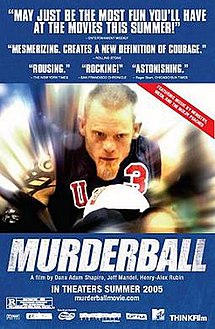Murderball (film)
| Murderball | |
|---|---|

Theatrical release poster
|
|
| Directed by |
Henry Alex Rubin Dana Adam Shapiro |
| Produced by | Jeffrey V. Mandel Dana Adam Shapiro |
| Starring | Keith Cavill Andy Cohn Scott Hogsett Christopher Igoe Mark Zupan Bob Lujano Joe Soares Brent Poppen |
| Music by | Jamie Saft |
| Cinematography | Henry Alex Rubin |
| Edited by | Conor O'Neill Geoffrey Richman |
|
Production
company |
|
| Distributed by | ThinkFilm |
|
Release date
|
|
|
Running time
|
88 minutes |
| Country | United States |
| Language | English |
| Box office | $1,750,211 |
Murderball is a 2005 American documentary film about physically disabled athletes who play wheelchair rugby. It centers on the rivalry between the Canadian and U.S. teams leading up to the 2004 Paralympic Games. It was directed by Henry Alex Rubin and Dana Adam Shapiro, and produced by Jeffrey V. Mandel and Shapiro. It was nominated for Best Documentary Feature for the 78th Academy Awards.Murderball was the first MTV film released through ThinkFilm as well as Participant Media.
The film was screened at the United Nations uncut. One of its stars, Mark Zupan, winced when describing how embarrassed he was to have his mother hear his remarks on the sex lives of persons with quadriplegia.
Murderball was shot on a low budget. The main camera used was a Panasonic AG-DVX100; a Sony PD150 was used to shoot some of the early interviews. The crew rigged a Sennheiser shotgun microphone to use as a boom, and relied heavily on Lavaliere wireless microphones as well. Available lighting was used almost exclusively. Additional light was provided using an inexpensive china ball. In one example of on-the-spot lighting, a flashlight was diffused using only a napkin.
Murderball garnered almost universally positive reviews; it currently holds a 98% 'fresh' rating on Rotten Tomatoes, with the consensus "An entertaining and gripping documentary that shows being confined to a wheelchair doesn't mean the fun has to end." This film is also #1 on the Rotten Tomatoes countdown of the top sports movies.Murderball also received positive reviews from Hollywood.com and Roger Ebert, who said "This is one of those rare docs, like Hoop Dreams, where life provides a better ending than the filmmakers could have hoped for."
...
Wikipedia
